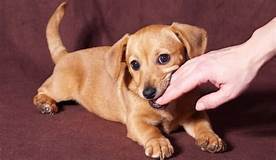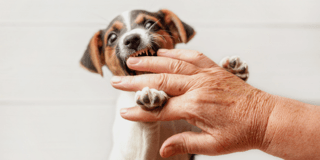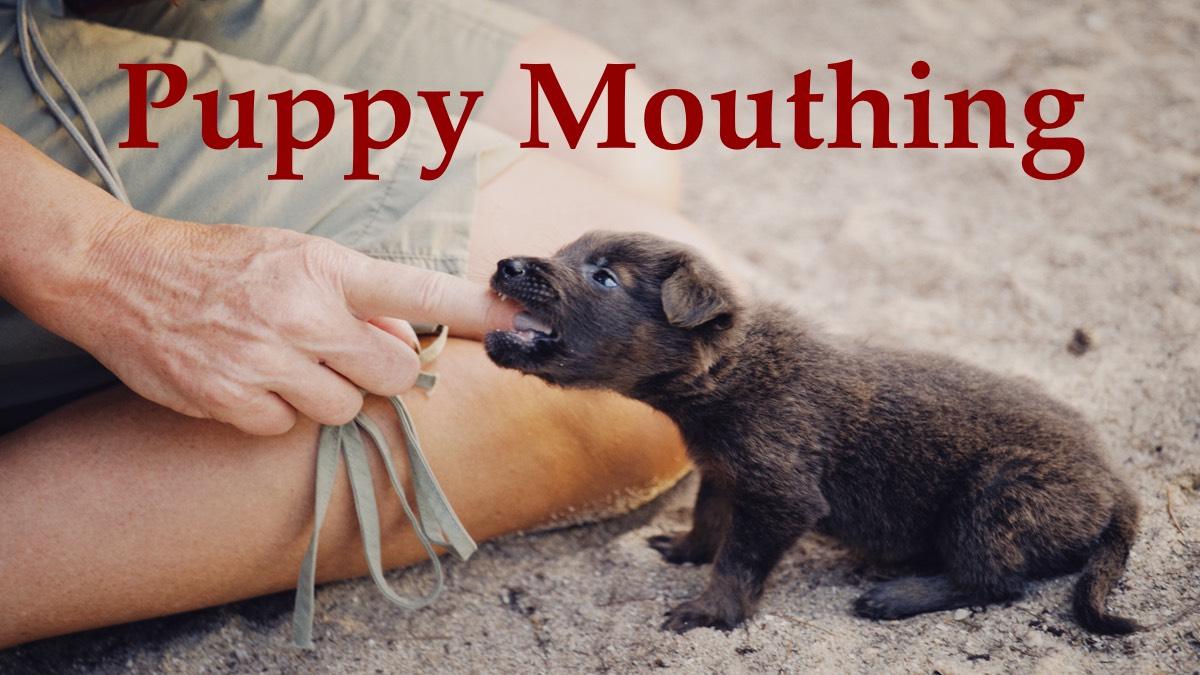Puppies naturally explore the world with their mouths as they don’t have hands. They may even swallow both edible and non-edible items so close supervision is recommended.

Puppies love to nip you and even grab your clothing especially when they get excited. This becomes a much larger issue when the dog matures and has a greater bite strength.
Most puppies grow out of the mouthing stage once they stop teething and get their adult teeth. In the meantime, you are dealing with sharp little teeth that can do a lot of damage.
You need to teach your dog that teeth on human skin is never acceptable at any age.
The following strategies will help to prevent mouthing from becoming a bad habit.
Removing your attention
If your puppy mouths your skin or clothes, stand with your arms crossed and turn away. If he continues, leave the room and wait for ten seconds behind a closed door. Re-open the door and reward with a treat if he is sitting or keeping all four paws on the ground.
He will learn that mouthing takes your attention away.
Interrupting play
Begin playing with him. When he nips you or grabs your clothing, you yelp loudly “ouch” and then ignore him. You can also say “hands” at the same time, so he starts to associate this with him clamping down on your hands.
He will learn that mouthing stops the game.
Allowing playtime with other puppies and calm adults
While playing with other puppies and friendly, older dogs, your young dog may get too rough with his nipping.
The other dogs will teach him to moderate the strength of his bite by using their bodies and teeth in response. Only dogs can teach your puppy valuable “bite inhibition.”
Redirecting his mouthing
Offer him a tug toy while you are playing with him so he can give his attention to an inanimate object if he gets too excited, the toy goes dead and play stops.
Never wrestle with your dog or use your hands as toys or wave them around. This would create hyper-arousal and result in accidental scratches or bites from his teeth.
Giving him appropriate chews
All dogs need to chew whether they are teething or not. It is a calming, enriching and therapeutic activity for them.

Make sure that the chews you provide your puppy are not too hard and appropriate in size for your particular breed and age of dog.
Hard knuckle bones, deer and elk antlers or cow hooves can fracture teeth and small leftover pieces may become choking hazards.
Rawhide should never be given as it is bleached or washed in formaldehyde to make it white. Your dog’s saliva will soften the material. If ingested, internal blockages may result. Chemical preservatives and dyes used to make the rawhide more palatable are also dangerous for your dog’s health.
Appropriate chews include vegetable-based chews, bully sticks (beef pizzles) or raw chicken necks while supervising your dog. Stuffed kongs or licki-mats provide lasting enrichment when you can’t watch your puppy.
Teaching mouth manners
Hold a treat between your thumb and middle finger and offer it to your dog. Allow him to have the treat when he is licking rather than biting your fingers.
You can add a word like “gentle” before releasing the treat to your dog’s mouth.
Accustoming your dog to being handled
To prevent your dog from biting your hand when you touch him, pair handling his body with yummy treats to create a positive association in his mind. He learns that being touched results in getting treats.
Start by putting a handful of treats in your flat palm and offer them to your dog.
Once he starts eating the food, use your other hand to gently pet him from his neck to the base of the tail. Although dogs will tolerate pats on the head from people they know, they don’t like it.
To get him used to being examined by a vet or groomer, briefly lift his ears or tail, run your hand down his legs and put some pressure on his paws while he is eating food from your palm.
If he stops eating the treats, your other hand goes away from his body.
As soon as the food is eaten from your hand, stop the handling and put some more treats in your hand.
Providing your dog with a brief time out
If he is getting too excited and is not settling after you finish playing with him, calmly give him a brief time out in his kennel or exercise pen. You can add a cue “timeout” and give him an appropriate chew.
Never yell at or punish your puppy if he accidentally nips you. This would erode his trust and is not teaching him to be gentle with his mouth.

